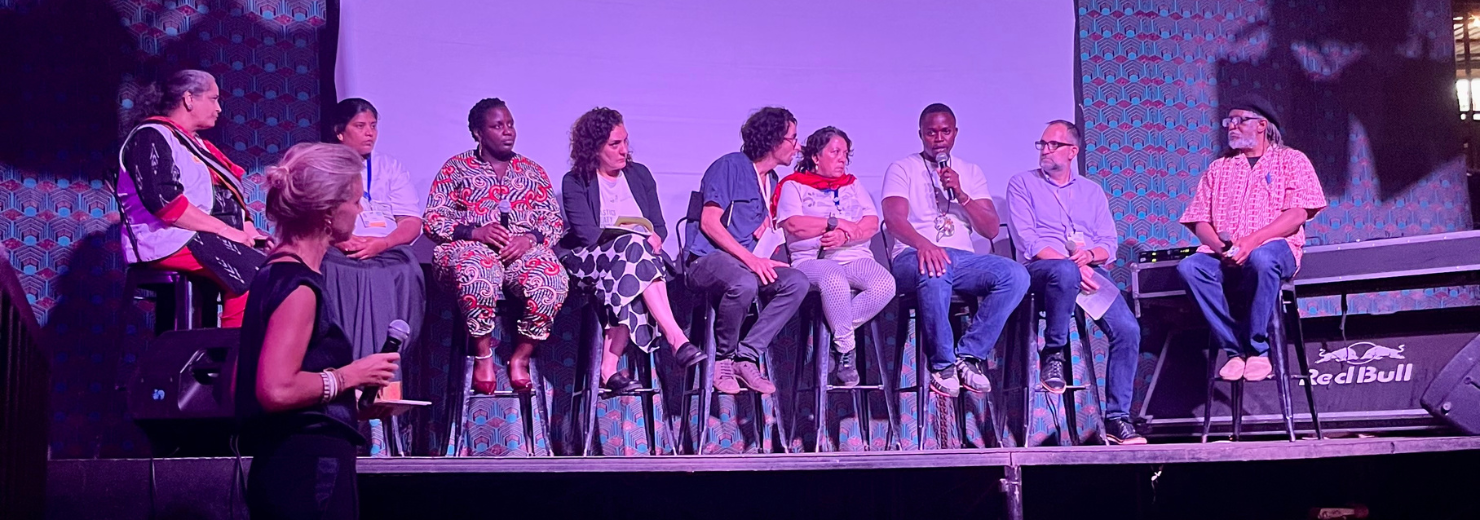From one voice to many: Reflections from INC-3
-

-
Annerieke Douma
-
November 28, 2023
-
4 min read

Annerieke Douma
November 28, 2023
4 min read


Earlier this month, I traveled to Nairobi, where representatives from nearly every country in the world gathered at the UN Headquarters to continue the negotiations on the UN Global Treaty to End Plastic Pollution. Hope, constructive negotiations, and high spirits dominated the first half of the week. As Kenyan President Dr. William Ruto stated in his opening remarks “Humanity spoke in one voice when 170 nations agreed to develop a globally binding instrument during the General Assembly in Nairobi beginning of 2022.” This one voice has become many voices with different interests at stake, with varying levels of ambition.
The Circulate Initiative advocates for a robust, globally-binding treaty to end plastic pollution that includes several critical elements:
- A reduction in the amount of plastic produced, especially for single-use applications such as food service packaging.
- A science-based, life-cycle approach to addressing the plastic pollution challenge, from product and packaging design to end of life.
- Financial mechanisms and policies that provide the incentives and ground rules for businesses to transition to implementing circular solutions.
- Support for the communities that are most impacted by the consequences of plastic pollution in the form of funding through innovative financial mechanisms, technical support, and capability building to build waste management infrastructure and deal with legacy plastic waste.
- A just transition that leaves no one behind, acknowledging and integrating indigenous peoples, informal sector waste workers, and other vulnerable communities in decision-making and integration into plastics recycling value chains.
The Process Met with Challenges
A small minority of member states rejected the zero draft, threatening provisions to reduce plastic pollution and advocating mainly for downstream solutions such as recycling. This minority position left the INC Secretariat with no mandate to commission official intersessional work between the Nairobi session and INC-4 in April 2024.
A considerable amount of intersessional work is needed to prepare for INC-4, including clarity on definitions and metrics, mechanisms to ensure a just transition, and global mechanisms to direct financial flows to the communities where the effects of plastic pollution are most felt. According to The Circulate Initiative’s recently refreshed Plastics Circularity Investment Tracker, emerging markets in Asia, Africa, and Latin America are hotspots for plastic pollution, but less than 10% of all private investment was made in these regions. Countries in these regions often lack basic waste collection services and infrastructure – a key reason for high rates of incineration, landfill, and discarding of waste into the environment.
Finally, the comprehensive draft zero treaty of roughly thirty pages became a much longer document in the hundreds of pages that will need to be negotiated during INC-4 in Ottawa. As decision-making is based on consensus the risk of a watered-down treaty is very real.
Reasons to be Optimistic
A few highlights that gave me some hope were the fact the majority of member states chose to fight for an ambitious treaty, with more than 100 countries supporting global bans and phase-outs of the most harmful and avoidable plastics. The Business Coalition for a Global Plastics Treaty (representing 170 leading companies and organizations) continues to fight for an ambitious treaty, stating the importance of reducing plastic production and use through a circular economy approach.
Waste pickers achieved significant progress in this negotiation session in Nairobi. They requested to incorporate the term “waste picker” in the treaty, to cross reference just transition throughout the text including in the objective, and to define the term waste pickers, just transition, and workers in the informal and cooperative settings. The new draft for negotiation during INC-4 in Ottawa now includes “waste pickers” and their main requests are a part of the new draft. Member states have committed to defining waste pickers and a just transition in the next negotiations.
Aligned with our work on responsible sourcing and addressing human rights issues, The Circulate Initiative and UN-Habitat co-hosted an event titled: ‘VOICES: Empowering waste workers on the path to a just transition’. The event showcased the crucial role waste workers play in tackling the global plastic waste challenge and exploring mechanisms for their integration in the plastics recycling value chain. Kicking off with a movie screening spotlighting the journeys, challenges and aspirations of waste workers from Vietnam, South Africa, India and Nigeria, the event also featured a panel of diverse stakeholders that offered insights on how waste worker voices can be amplified at the negotiating table.
Although the outcomes from the negotiations are disappointing, I remain hopeful as this treaty is our once-in-a-lifetime chance to speak with one voice to support our planet, the people, and all living beings that heavily depend on the outcomes of this process.
View the movie screened at our INC-3 event here: https://youtu.be/kopFJdxtCUI
Access our digital resource kit on the topic of a just transition and responsible sourcing in the plastics value chain here: https://bit.ly/3FZy6yB